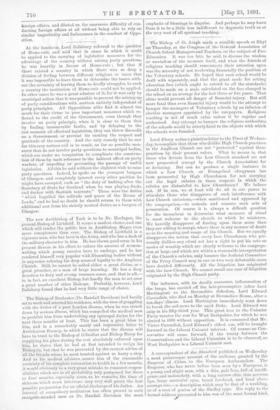Lord Ebury writes a plaintive letter to the Times of
Wednes- day, to complain that those who dislike High Church practices in the Anglican Church are not " protected " against those practices by their present rulers. What he means is, that those who deviate from the Low Church standard are not now prosecuted (except by the Church Association) for so deviating. But can he produce a single instance in which a Low Church or Evangelical clergyman has been prosecuted by High Churchmen for not carrying out the legal rubrics in those respects in which the rubrics are distasteful to Low Churchmen ? We believe not. If he can, we at least will do all in our power to stimulatethose who disapprove of such interference with Low Church omissions,—when sanctioned and approved by the congregation,—to restrain and censure such acts of prosecution. Of course it is always a difficult question for the incumbent to determine what measure of ritual is most welcome to the church to which he ministers.. We heartily disapprove of forcing upon them more than they are willing to accept, where there is any manner of doubt as to the meaning and usage of the Church. But we equally disapprove the notion that every Low Churchman who per- sonally dislikes any ritual act has a right to put his veto on modes of worship which are clearly welcome to the congrega- tion at large, and which are within a reasonable interpretation of the Church's rubrics, only because the Judicial Committee of the Privy Council may in one or two very debateable cases have decided differently. All the litigation has originated with the Low Church. We cannot recall one case of litigation originated by the High Church party.


































 Previous page
Previous page